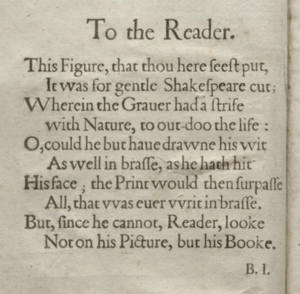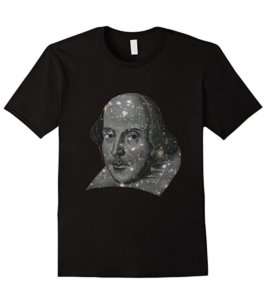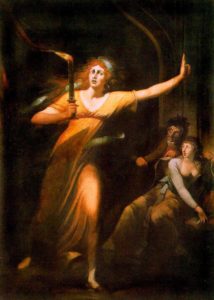Well folks, I’ve been having fun designing Shakespeare t-shirts, but not everything can be a “Mercutio Drew First” top seller :). Amazon’s got a “30 days or it’s de-listed” policy, so the following designs, which sometimes went up so fast people didn’t even get a chance to see them, are now in danger of disappearing. So if you’re looking to add to your wardrobe, or for something to give as a gift (buy now, keep it until Christmas!) it would help me out greatly if this was the week you decided to hit the buy button. If they go, they go, and I’ll keep bringing up new designs. But I wanted to make sure that I put the word out that they *are* possibly going, in case anybody had seen them once and thought that they might come back later and get it. Later might be too late!
Maybe I’m the only one that finds this joke funny. It’s originally from our #ShakespeareanFirstDrafts Twitter hashtag game and reads, “Holy $%^& Yorick Died?!”
“There is nothing either good or bad, but thinking makes it so.” I have two versions of this, one with a red devil and this one with the green. I actually made them for my son (the little devil :)). But he’s got the red one.
I like to think of these two as a set. I couldn’t decide which one so I made both. Maybe it’s the color combinations people didn’t love? You just gotta tell me, people. I can always change it!
If I was ruled entirely by research, I would have nothing but “Shakespeare insult” t-shirts. I decided to put one up and see if anybody was interested, but truthfully my heart wasn’t in it. I like the original material better.
If you like the general idea of what I’m trying to do here but haven’t yet seen the one that screams “Yes, I must have it!” don’t be afraid to write in with your suggestions. Several designs (which are not here, because they are selling :)) come straight from Facebook and Twitter followers offering up ideas. This is especially true if you don’t like a particular color combination (I’ve met as many people who only do black t-shirts as those who ever do black t-shirts :)). That’s easy because I already have all the image files!
I can’t tell you how much I appreciate the business! Every time I check my stats and see the numbers go up I think, “There’s a little more Shakespeare released out into the world.” The dream is to one day bump into a stranger wearing a shirt that I know I made! Shakespeare makes life better!




